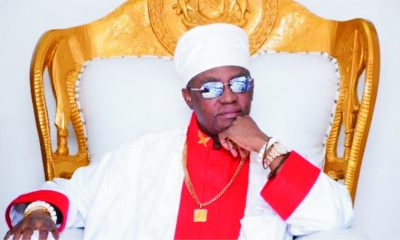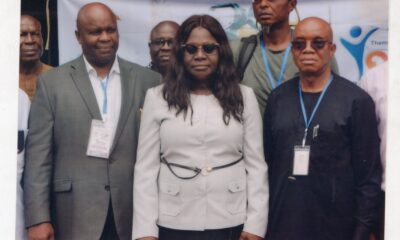Business
UN Tasks African Leaders On New Urban Agenda

From Left: Commissioner for Works,Lagos State, Mr Ganiyu Solomon, Governor Akinwunmi Ambode of Lagos, Commissioner for Physical Planning, Mr Wasiu Anifowose and Divisional Police Officer Ilasan, SP Oyinye Onwuamaegbu during an inspection of the site of Lekki collapsed building in Lagos last Tuesday
African leaders have
been charged to develop rural areas to solve the challenges of urban cities in Africa.
The UN-Deputy Secretary-General, Housing and Sustainable Urban, Kumaresh Misra, made this call at the United Nations Habitat 111 Africa Regional Meeting Abuja.
Misra, who was speaking at the opening of the technical session of the meeting, stressed the need for effective planning to manage rural-urban migration, noting that the importance of urbanization was the reason it was listed in the Sustainable Development Goals (SDG).
He explained that cities of developing nations such as Nigeria need to develop counter measures ahead of increasing population in the country.
According to him, “this region has shown great progress and also has great potential but also offers great challenges as we see a sharp increase in especially urban population. There is need to manage the cities to meet the 2030 sustainable development to make cities safe, inclusive, resilient and sustainable”.
He further said, “we need integrated approach to manage new cities as agent of growth not only interms o f housing or security but to make it viable for economic sustainability”.
He continued, “the, prosperity of nations is intimately linked to the prosperity of cities in the current scenario. It is necessary to recognize and integrate all aspects of human settlement which will contribute towards greater social cohesion, promote innovation and truly build an inclusive and dynamic society”.
On his part, Nigerian’s representative to UN habitat, Mr Akin Oyateru, restated the need for government and other stakeholders to put more efforts on planning to meet development.
Oyateru called for extensive planning of cities years ahead of expansion, adding, “one of the new programmes is urban approach, activities that would change the imbalance and decongest the city centre. The new urban agenda is a new multi sectoral approach where urbanization is looked from a holistic approach to drive sustainable developmental policies that would benefit the masses”.
The Minister of State for Power, Works and Housing, Mr Mustapha Baba Shehuri, who declared the technical session open said the situation in urban cities across the continent was not encouraging and promised that the federal government would redouble its effort to address the situation.
Business
MWUN Backs Nigeria’s Bid For IMO’s Category C Seat
Business
Food Security: FG To Review Nigerian Agric laws
Business
Okpebholo Charges Committee To End Herders, Farmers Clash In Edo … Inaugurates Boundary Committee
-
News4 days ago
Military Kills 6,260 Terrorists, Rescues 5,365 Civilians In 2 Years – DHQ
-

 News4 days ago
News4 days agoBenin Monarch Receives 119 Stolen Artefacts From Netherlands
-
Sports4 days ago
Winners Emerge At Lagos Cricket League
-
Business4 days ago
Nigeria, Others Listed On UN’s Worsening Hunger Hotspots
-
Business4 days ago
Create Diving Schools, Expert Urges FG
-

 News4 days ago
News4 days agoFoundation Tasks Parents, Families On Moral Rectitude
-
News4 days ago
COAS Hails 542 New Military Retirees Over Selfless Service
-

 Politics4 days ago
Politics4 days agoYou Weren’t Elected To Bury People, Tinubu Tells Alia

